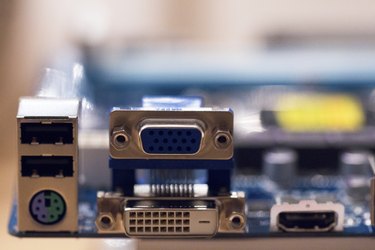
It's easy to think of your laptop or your smartphone as being a cute, personal device without any environmental impact. Computers and consumer electronics are marketed to appeal to your sense of connection with the gadget, while obscuring the potential they have to pollute the Earth.
Manufacturing Environmental Impact
Video of the Day
Computers and consumer electronics are the end result of a vast international manufacturing process. Most motherboard components use rare earth minerals and metals, including gold and silver. Also, motherboard components are treated with a range of industrial compounds, many of which are toxic.
Video of the Day
Electrical Usage and Environmental Impact
Most computers are left to run constantly; even small computers like smartphones do this. Globally, computer data centers use a tenth of the world's electrical power, according to Time magazine, and a smartphone, over the course of a year, may use electricity comparable to that used by heavy-duty appliances like refrigerators. Most of the electricity that's consumed by computers is turned into waste heat. Recent improvements in processor design are focusing on energy efficiency to address problems such as these.
Disposal and Recycling
Electronic devices that end up in landfills pose heavy metal contamination risks, so they should always be recycled appropriately. Many recycled electronics and their associated waste are shipped overseas, where they are not recycled responsibly. According to one United Nations report, nearly 70 percent of e-waste is shipped to a poor region of China. Workers there dip the components into solvents and acids to recover copper and gold from circuit boards, which releases PCBs and other hazardous chemicals into the air. The parts that can't be recycled are often dumped into streams or burned in bonfires.
Reducing E-Waste on Disposal
The choices you make as a consumer have an impact. The bulk of the computer pollution problem stems from improper disposal of old hardware. Apple has one of the best e-waste recycling programs in the industry and doesn't ship e-waste outside of North America. When it comes to disposing of your electronics, focus on recycling centers that don't ship them overseas. Look for locations that offer responsible recycling, which is done in an environmentally conscious way and involves salvaging and reusing materials.
Cutting Back on Energy Usage
To minimize the pollution impact of the electronics you already own, unplug devices from chargers. Keep in mind that an AC adapter continually draws current when your laptop or tablet is plugged in. Turn computers off when they are not in use, and if you leave on a trip, turn off your Wi-Fi gear and unplug any electronics you leave behind.